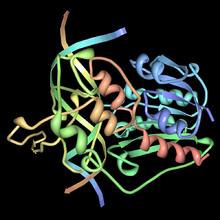- Methyltransferase
-
 Methyl-Group
Methyl-Group
A methyltransferase is a type of transferase enzyme that transfers a methyl group from a donor to an acceptor.
Methylation often occurs on nucleic bases in DNA or amino acids in protein structures. Methytransferases use a reactive methyl group bound to sulfur in S-adenosyl methionine (SAM) as the methyl donor.
DNA methylation is often utilized to silence and regulate genes without changing the original DNA sequence, an example of epigenetic modification. This methylation occurs on cytosine residues. DNA methylation may be necessary for normal growth from embryonic stages in mammals. When mutant embryonic stem cells lacking the murine DNA methyltransferase gene were introduced to a germline of mice, they caused a recessive lethal phenotype.[1] Methylation may also be linked to cancer development, as methylation of tumor suppressor genes promotes tumorgenesis and metastasis.[2]
Site-specific methyltransferases have the same DNA target sequences as certain restriction enzymes. Methylation can also serve to protect DNA from enzymatic cleavage, since restriction enzymes are unable to bind and recognize externally modified sequences. This is especially useful in bacterial restriction modification systems that use restriction enzymes to cleave foreign DNA while keeping their own DNA protected by methylation.
Methylation of amino acids in the formation of proteins leads to more diversity of possible amino acids and, therefore, more diversity of function. The methylation reaction occurs on nitrogen atoms either on the N terminus or on the side-chain position of the protein and are usually irreversible.
Examples include:
- DNA methyltransferase
- Histone methyltransferase
- 5-Methyltetrahydrofolate-homocysteine methyltransferase
- O-methyltransferase
References
- ^ Li, En., Bestor, T., Jaenish, R., "Targeted mutation of the DNA methyltransferase Gene Results in Embryonic Lethality,"Cell (1992), Vol 69, pg915-926.
- ^ Laird, PW., Jaenisch, R., "DNA Methylation and Cancer,"Human Molecular Genetics (1994), Vol 3, pg1487-1485.
External links
- MeSH Methyltransferases
- 3-D Structure of DNA Methyltransferase
- A novel methyltransferase : the 7SK snRNA Methylphosphate Capping Enzyme as seen on Flintbox
Transferase: one carbon transferases (EC 2.1) 2.1.1: Methyl- N-O-Other2.1.2: Hydroxymethyl-,
Formyl- and RelatedHydroxymethyltransferaseFormyltransferaseOther2.1.3: Carboxy- and Carbamoyl CarboxyCarbamoyl2.1.4: Amidino Arginine:glycine amidinotransferaseB enzm: 1.1/2/3/4/5/6/7/8/10/11/13/14/15-18, 2.1/2/3/4/5/6/7/8, 2.7.10, 2.7.11-12, 3.1/2/3/4/5/6/7, 3.1.3.48, 3.4.21/22/23/24, 4.1/2/3/4/5/6, 5.1/2/3/4/99, 6.1-3/4/5-6 
This enzyme-related article is a stub. You can help Wikipedia by expanding it.


